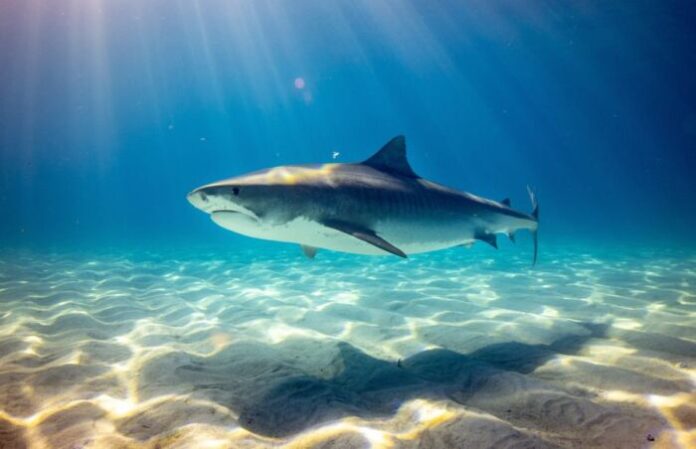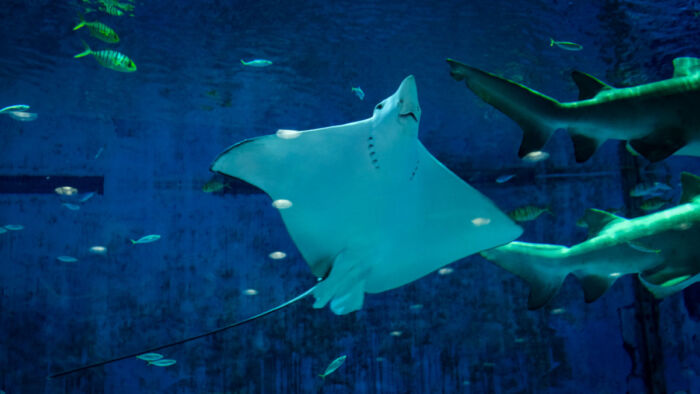
Shark Awareness Day is celebrated today on 14 July. It is an opportunity to raise public awareness of the importance of sharks for the marine ecosystem, dispel myths about the danger of these species and suggest behaviors in favor of their protection.
A large number of shark and ray species – some of them critically endangered – are regularly caught illegally by nets and longlines in the Mediterranean, as revealed by numerous reports received by the WWF from a regional Citizen Science initiative. Due to this widespread illegality and the lack of adequate management and control, a veritable slaughter of sharks, rays and torpedoes is consumed every year in the Mediterranean which causes enormous damage to the marine ecosystem. The Mediterranean is therefore confirmed to be one of the worst seas in the world in the protection of sharks.
WWF calls on all Mediterranean countries to act urgently to improve information and awareness among fishermen, strengthen controls and ensure an adequate reporting system for catches of sharks and rays.
Sharks and rays are fundamental indicators of ocean health and their ‘beneficial’ effects on marine balances extend from the surface to the deepest seabed. In many areas of the world they also represent an important economic resource in tourism.
The MECO (Mediterranean Elasmobranch Citizen Observation) Project, a Mediterranean initiative made up of local “Citizen Scientists”, has shared dozens of photos and videos posted on social media with the WWF in recent years in Italy, Spain, France, Greece, Croatia , Cyprus, Turkey, Tunisia, Libya, Algeria and Morocco. Evidence gathered only in the past 3 years shows fishermen illegally capturing and landing protected species of shark and breed, including angel sharks and great white sharks, all of which are threatened with extinction. In addition to these, the palombi, species dramatically decreased by 90% in the Mediterranean but for which there is no adequate official reporting system. In some cases, as in the recent case of Catania, sharks belonging to threatened species also end up in local markets, ‘passed off’ for swordfish or other commercially more valuable species.
There are no countries exempt from this slaughter: illegal landings of sea devil (mobula) are registered in Algeria, Libya, Turkey and Spain, the great white shark, the mako shark and the hammerhead shark end up in the markets of Morocco, Tunisia, Italy and France despite being in serious danger of extinction. Catches of lesser known species – but still in serious danger of extinction – such as the altavela are reported in Greece, Spain, Libya and Turkey. Palombi can be found in Croatian markets, but data on their catches are scarce.
“We knew that sharks and rays were caught and landed illegally in the Mediterranean, but these reports provide further confirmation of how widespread the phenomenon is throughout the basin and how the impact affects a large number of endangered species. It is shocking that the laws protecting sharks and stingrays in the Mediterranean are being continuously broken with few, if any, consequences, and that existing tools to improve fisheries management are still not being used effectively. The extinction of even one of these predators from our sea would be a tragic loss for the entire marine ecosystem, “said Giulia Prato, marine biologist and WWF Italy Sea Officer.

The Mediterranean is a biodiversity hotspot for sharks and rays, with more than 80 different species surveyed, but more than half are threatened and some are at risk of extinction. Although the legislation prohibits the landing of protected shark and breed species and eases fishing pressure on other species, the collection is controlled in a very rough way with prohibitions often ignored. Insignificant regulations aimed at the conservation of vulnerable populations are not effective at all, often not even applied correctly at national level, and – as the WWF testimonials show – the rules in force are systematically ignored in markets throughout the region. The result is that endangered shark and race species are caught illegally, while for others the reporting and management system in place is scarce or even zero.
“To date, no Mediterranean state – including Italy – has fully outlined a national plan for the conservation, management and long-term sustainable use of sharks and rays. We can no longer wait ”, concludes Giulia Prato.
WWF works across the Mediterranean with fishermen and other stakeholders to improve awareness of endangered species and develop new strategies to avoid accidental catches of sharks and rays. At the same time, the association is pressuring governments to increase controls to combat illegal activities and to ensure more sustainable management of fishing activities that impact on sharks. Particular attention is paid to critical habitats, such as feeding and nursery areas, which, for the WWF, should also be protected from destructive economic activities.
In Italy, WWF is collaborating with fishermen’s cooperatives, NGOs and researchers in the southern Adriatic to address the serious lack of information on sharks and their threats. Thanks to special satellite tags, the survival capacity of animals accidentally captured and released using appropriate methods is being monitored. Italy and Albania, in fact, share important fishing areas for swordfish and in these areas the bycatch of sharks and rays is very high. Recognition cards and training meetings have allowed the creation of communities interested in the protection of sharks.



































